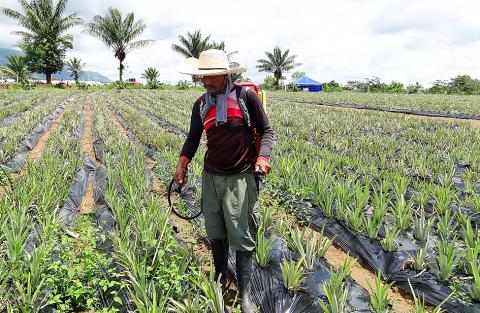Felix Salcedo lost an arm fighting during Colombia’s half-century civil war that ended in August. Today, he uses his remaining arm to grow pineapples.
Like dozens of other former Revolutionary Armed Forces of Colombia (FARC) guerrillas in his village, Salcedo is trying to earn a living legally after his rebel movement disarmed under a peace deal in December last year with the government.
Salcedo, 38, thinks back on the half of his life he spent with Colombia’s largest rebel force, which last month transformed into a political party.

Photo: Reuters
An anti-personnel mine tore off Salcedo’s left arm, he says as he sprays pesticides at the plantation of 20,000 young pineapple plants.
Peace has not come easily to the nation where for decades the FARC controlled areas where coca leaf and cocaine production flourished.
Not only have there been delays in implementing the peace accord, but the ex-combatants face strong temptations to join dissident rebels, keep their weapons and traffic drugs.
Last week, UN Assistant Secretary-General for Human Rights Andrew Gilmour said “reintegration is not going so well,” because “there is nothing” for returning FARC fighters.
La Montanita village, with its houses of metal sheeting and zinc roofs surrounded by emerald green plantations, is considered a success for the peace plan.
In the nation’s south, it is one of 26 demobilization zones for the 7,000 ex-FARC members.
His fighting days are over, but Salcedo has found renewed motivation from the esprit de corps that kept FARC going for 53 years.
“To be united, that’s what it takes to work, to carry out future projects,” he says of the pineapples, planted thanks to a fund created by 150 former rebels assisted by a public subsidy.
In this jungle zone that was a historic bastion of FARC, about 250 ex-rebels came together to start their lives anew in agriculture, fish farming or as cobblers.
Some have opened bookstores or bakeries.
The aim is to transform the demobilization zones into villages for former FARC members and their families, so they can put into practice the socialist ideals on which their movement was founded.
FARC and another rebel group were formed in 1964 to fight for land rights and protect poor rural communities.
Over subsequent decades, the conflict drew in paramilitary groups and state forces in what became a many-sided war fueled by drug trafficking.
It left about 260,000 people dead, 60,000 unaccounted for and 7 million displaced in Latin America’s longest conflict.
“This process we are going through is harder than the war itself... We have to invent [these projects] and a whole lot more,” said Danilo Ortiz, who spent 20 of his 34 years in FARC.
Now he repairs shoes.
“What we see here is a good example of how the reintegration process should be carried out,” said Jean Arnault, a Frenchman who heads the UN mission in Colombia.
The UN was tasked with supervising the guerrillas’ disarmament and return to civilian life.
However, elsewhere in the nation, ex-guerrillas have quit the reintegration program, deciding to find their own ways of making a living or to join dissident rebels.
Between 500 and 800 have turned to the dissidents, State Ombudsman Carlos Negret said.
“If people in the countryside don’t see state aid arriving, it’s going to be very difficult to have the conditions needed for the peace process,” he said.
FARC’s former commanders criticize the government of Columbian President Juan Manuel Santos for not respecting what was negotiated. The government attributes delays in implementing the accord to bureaucratic and logistical problems.
“The state must be reintegrated in all the regions that were left aside,” former commander Pastor Alape said.
Salcedo and Ortiz share Alape’s frustration, but want to be more hopeful.
They smile as they consider the “collective effort” that will produce the income from the village’s first peacetime harvest of pineapples.
“United, we will never be defeated,” Ortiz says, in an old revolutionary refrain.

‘EYE FOR AN EYE’: Two of the men were shot by a male relative of the victims, whose families turned down the opportunity to offer them amnesty, the Supreme Court said Four men were yesterday publicly executed in Afghanistan, the Supreme Court said, the highest number of executions to be carried out in one day since the Taliban’s return to power. The executions in three separate provinces brought to 10 the number of men publicly put to death since 2021, according to an Agence France-Presse tally. Public executions were common during the Taliban’s first rule from 1996 to 2001, with most of them carried out publicly in sports stadiums. Two men were shot around six or seven times by a male relative of the victims in front of spectators in Qala-i-Naw, the center

Incumbent Ecuadoran President Daniel Noboa on Sunday claimed a runaway victory in the nation’s presidential election, after voters endorsed the young leader’s “iron fist” approach to rampant cartel violence. With more than 90 percent of the votes counted, the National Election Council said Noboa had an unassailable 12-point lead over his leftist rival Luisa Gonzalez. Official results showed Noboa with 56 percent of the vote, against Gonzalez’s 44 percent — a far bigger winning margin than expected after a virtual tie in the first round. Speaking to jubilant supporters in his hometown of Olon, the 37-year-old president claimed a “historic victory.” “A huge hug

Two Belgian teenagers on Tuesday were charged with wildlife piracy after they were found with thousands of ants packed in test tubes in what Kenyan authorities said was part of a trend in trafficking smaller and lesser-known species. Lornoy David and Seppe Lodewijckx, two 19-year-olds who were arrested on April 5 with 5,000 ants at a guest house, appeared distraught during their appearance before a magistrate in Nairobi and were comforted in the courtroom by relatives. They told the magistrate that they were collecting the ants for fun and did not know that it was illegal. In a separate criminal case, Kenyan Dennis

The US will help bolster the Philippines’ arsenal and step up joint military exercises, Manila’s defense chief said, as tensions between Washington and China escalate. The longtime US ally is expecting a sustained US$500 million in annual defense funding from Washington through 2029 to boost its military capabilities and deter China’s “aggression” in the region, Philippine Secretary of Defense Gilberto Teodoro said in an interview in Manila on Thursday. “It is a no-brainer for anybody, because of the aggressive behavior of China,” Teodoro said on close military ties with the US under President Donald Trump. “The efforts for deterrence, for joint resilience